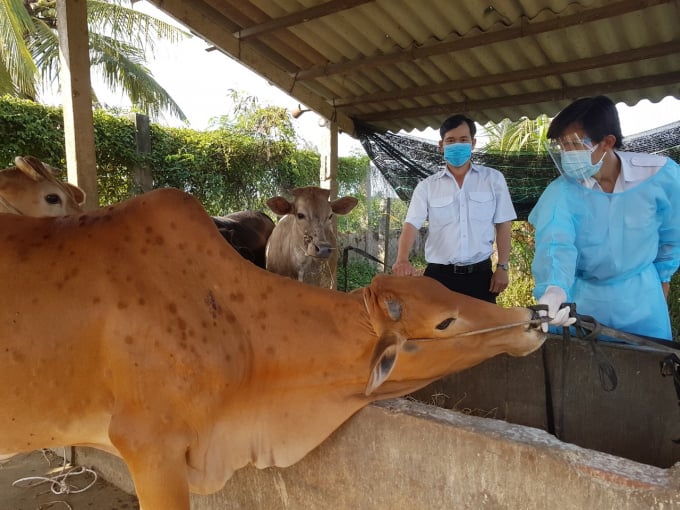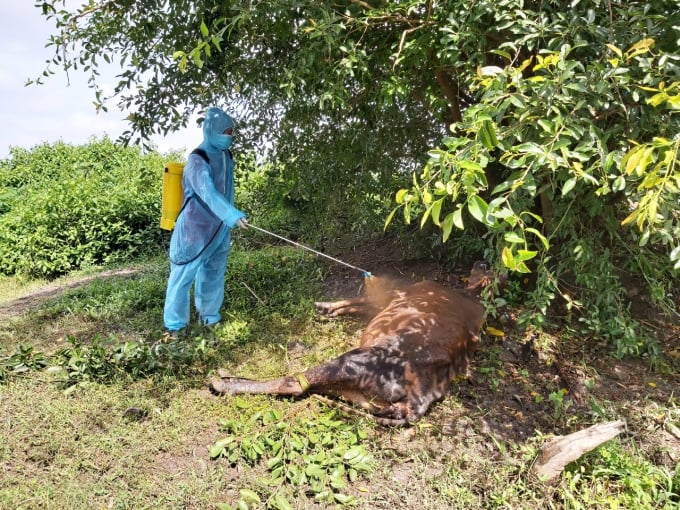June 5, 2025 | 06:58 GMT +7
June 5, 2025 | 06:58 GMT +7
Hotline: 0913.378.918
June 5, 2025 | 06:58 GMT +7
Hotline: 0913.378.918
Currently, hot weather and erratic rainstorms have reduced the immunity of livestock, creating conditions for disease outbreaks. In recent years, lumpy skind disease (LSD) in buffaloes and cows has appeared and spread rapidly in cattle herds within the Mekong Delta provinces.

Tien Giang province authorities checking cows for lumpy skin disease. Photo: Minh Dam.
According to the Department of Animal Health, LSD appeared in 117 commune-level units of 35 district-level units, towns, cities (districts) in 6/13 provinces in the Mekong Delta, including: Long An, Dong Thap, Tien Giang, Ben Tre, Tra Vinh and Kien Giang. As of September 14th, the total number of cows infected with the disease reached 1,811, of which 142 died.
The Department of Animal Health said that the vaccinations in many localities have proved that solution LSD prevention by vaccines is the most effective and the most important. The cost of using the vaccine is low (40,000 VND/dose), very effective compared to the high value of buffaloes and cows (about 15 million VND/head).
Tien Giang province has developed cow farming with a total herd of about 121,000 heads, mostly concentrated in some districts such as Cho Gao, Go Cong Tay, Go Cong Dong, Tan Phu Dong, Tan Phuoc. LSD in buffaloes and cows first occurred on August 16th, 2021 in Song Binh commune, Cho Gao district. By now, the disease has spread to 31 communes in 9 districts with 199 infected cows.
Nguyen Van Man, Director of Tien Giang Department of Agriculture and Rural Development, said that the Department is implementing a campaign to vaccinate against LSD in buffaloes and cows from August 25th, 2021 to September 25th, 2021 in high-risk regions with 50,000 doses of vaccine.
It is expected that Tien Giang Agriculture and Rural Development will continue to buy a second phase of 45,000 vaccine doses to ensure the vaccination rate at 90% of the total local buffalo and cow herd. Households raising buffaloes and cows will receive the vaccine free of charge, but the cost of vaccination must be paid by the owners themselves.
According to the assessment by the functional sector, the disease is progressing in Cho Gao and Tan Phuoc districts. Therefore, it is necessary to synchronously implement solutions to prevent and control LSD, protecting buffaloes and cows in particular and the local cattle industry in general.

Tra Vinh province's functional department disinfecting and preparing to dispose of cows with LSD. Photo: Minh Dam.
In Tra Vinh, LSD in buffaloes and cows first appeard from August 6th, 2021. By now, the disease has spread to 533 households in 29 communes in 6/9 districts. The total number of cows displaying symptoms of the disease reach 921 heads out of a total of 3,236 heads. Tra Vinh Agriculture and Rural Development has disposed of 40 animals with a total weight of over 8.4 tons.
According to Mr. Le Van Dong, Deputy Director of the Tra Vinh Department of Agriculture and Rural Development, the province has set up four checkpoints on three national highways 53, 54 and 60 to check and strictly control the transportation of animal products in and out of the province. When detecting buffaloes, cows and products entering and leaving the province illegally, they shall be handled according to regulations.
Additionally, Tra Vinh province also urgently vaccinated against LSD for buffaloes and cows in the whole province. As a result, vaccination has been carried out on 141,800 buffaloes and cows (reaching nearly 70% of cattle subject to vaccination) belonging to over 34,800 livestock households.
In Ben Tre province, according to Mr. Nguyen Van Buoi, Deputy Director of the Ben Tre Department of Agriculture and Rural Development, said: By now, LSD in buffaloes and cows have appeard in 46 households in 20 hamlets across 12 communes of 3 districts with the total number of infected cows at 61. To prevent the disease from spreading, the province has deployed over 92,500 doses of LSD vaccination. Of which, 42,700 are anti-epidemic doses, nearly 50,000 doses of self-vaccination, reaching nearly 44% of the total herd.
According to the Department of Animal Health, the risk of LSD continuing to spread rapidly and on a large scale is very high. The Department of Animal Health claims there are many reasons for the rapid spread of LSD. In which, some localities have not implemented drastic, synchronous, definitive and disposed of infected livestock when the disease first appeared. Equally important, the economic value of cattle is quite high while the policy to support the disposal of infected them is still low, so farmers sell and slaughter sick animals.
Besides, the transmission route is very complicated and difficult to control, spreading through disease vectors such as flies, mosquitoes, ticks, blood-sucking gulls... Cattles left grazing in fields and pastures is also popular. The demand for transporting and slaughtering livestock is still high. Extreme weather such as hot sun, storms and floods... reduces the immunity of livestock and pollutes the environment.
Translated by Nguyen Hai Long

(VAN) VAAS and numerous Vietnamese enterprises have signed cooperation agreements with Japanese partners to promote agricultural technology and trade connectivity.
/2025/05/29/5625-12-214801_567.jpg)
(VAN) Provincial mergers in the Mekong Delta promise to streamline administration, expand inter-provincial raw material areas, and foster close linkages in agricultural value chains, benefiting both businesses and cooperatives.

(VAN) Merging Mekong Delta provinces contributes to the expansion of agricultural raw material areas, addressing previous constraints caused by provincial boundaries. Additionally, this expansion will reduce costs and strengthen linkages between businesses, cooperatives, and farmers.
/2025/05/29/1043-2-153730_145.jpg)
(VAN) The Government's policy to merge provincial-level administrative units opens up major opportunities for the Mekong Delta region to reshape its agricultural development strategy toward large-scale production, effective regional linkages, and sustainability.

(VAN) The mutual export of agrifood products between the European Union (EU) and the United Kingdom (UK) must occur again without certification, border controls or other red tape. This was agreed at the UK-EU summit.
/2025/05/22/5121-2-173645_677.jpg)
(VAN) NBSAP Tracker identifies strengths and areas for improvement in the National Biodiversity Strategy, based on each region’s priorities and capacities.

(VAN) The draft amendment to the Circular on rice export trading stipulates a periodic reporting regime for rice exporting enterprises.